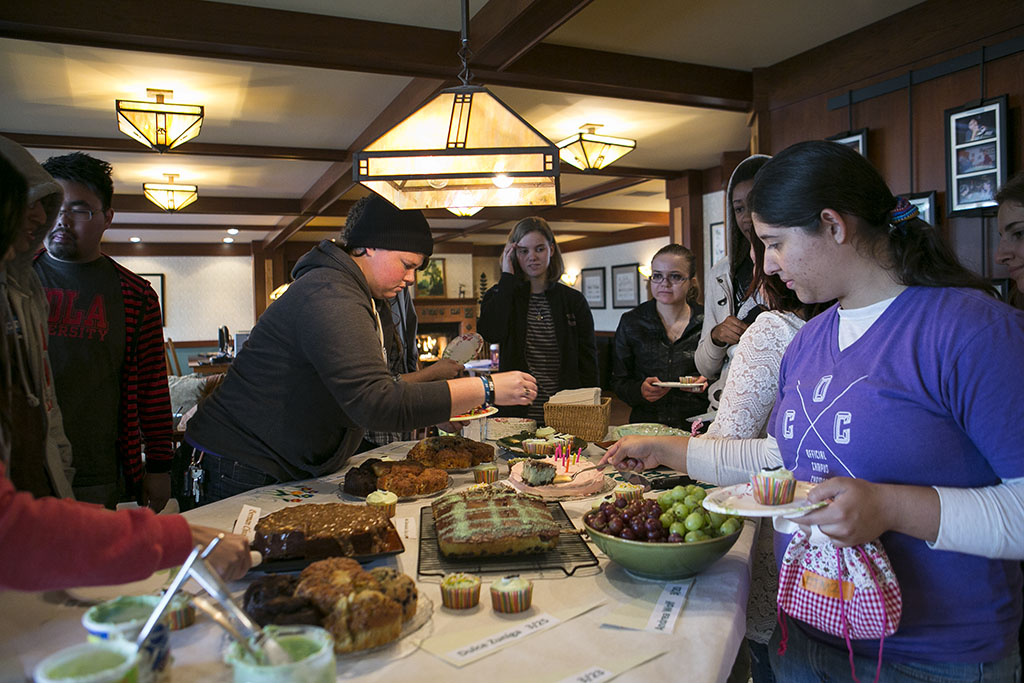
As Biola celebrates its 106th anniversary, many other parts of the university also mark milestones of their own. This semester rounds off the 10th year of the Collegium’s community for off-campus commuters.
COLLEGIUM OPPORTUNITY FOR CONNECTION
While many undergraduate students have their dorms to return to after classes, others only have their cars and a battle with traffic to get home at the end of a long day. Community is more difficult to come by without the aid of dorm life. With this in mind, the Collegium steps in to facilitate the community many off-campus students crave.
“It provides a place for community to happen,” Collegium director Katie Tuttle said. “By and large, what would happen with commuters on our campus is that they’d come onto campus, have their classes, and leave.”
Equipped with a kitchen, a comfortable lounge area and a computer lab, the Collegium in the upper Student Union Building has become the hangout of choice for commuter students. Apart from its helpful resources, it offers an opportunity for connection to off-campus students who might otherwise miss out.
“Without the Collegium, I don’t think that the commuters would in a way be able to survive at this school,” senior sociology major and Glendale commuter Arlene Haghverdian said. “That might sound funny, but I remember my first day coming here; I didn’t know anyone, but the second I walked in, I was welcomed. I felt respected as a commuter. This is my home away from home.”
According to Tuttle, it’s become much more to commuters than just a lounge.
“The first year, people came because it was pretty and it was convenient, but as they got to know people, community formed,” she said.
COLLEGIUM COMMUNITY EXTENDS BEYOND CAMPUS
Over the past 10 years, the community has grown beyond its walls and become central to the lives of commuter students. At the start of every semester, the Collegium provides several opportunities for commuter students to connect. This is in an effort to cure what Tuttle calls “the commuter ‘oh.’”
Tuttle says that during orientation when students discuss their living situations, off-campus students are met with a blank “oh” when they mention that they commute.
“In the beginning I was confused, like what’s wrong with it?” Haghverdian said. “More than a third of the students here are commuter[s]. There’s a lack of respect for commuter students. Having that connection was so helpful, for me at least, and I know a lot of people appreciate it as well.”
One thing Tuttle has noticed in the past ten years is the extent to which the community has blossomed.
“The first year, there were students that got to know each other a little bit, some community formed, but what I saw the second semester was interesting,” she said. “The groups of students would plan their schedules together, so they’d have gaps at the same time so they could hang out in the Collegium together. It went from just convenience to a little bit of community to students actually planning their gaps so they can hang out together.”
Once the ball was rolling, it only gathered momentum.
“Probably about the fourth year of operation, I started noticing that students started planning things outside the Collegium,” Tuttle remarked. “In fact, one year, there was a whole group of Collegium members who had Disneyland passes, and they would go to Disneyland together.”
Tuttle described this community momentum as the Collegium spilling over from the time spent in the lounge itself into the students’ free time on the weekends or in the evenings.
What was once a contained community was pouring over into the everyday lives of commuter students.
“There’s a lot of student care that goes on there, whether they’re having a tough time or if they’re celebrating,” Tuttle said.
The Collegium and Commuter Life staff members have nurtured this growth through everything from event planning and social media to knowing and being available to the students. They also encourage students to spread the community beyond the lounge and into the clubs and other groups on campus.
“We’re a bridge too,” Tuttle remarked. “We try to bring them in, help them form community and then bridge them out to the life of campus.”







